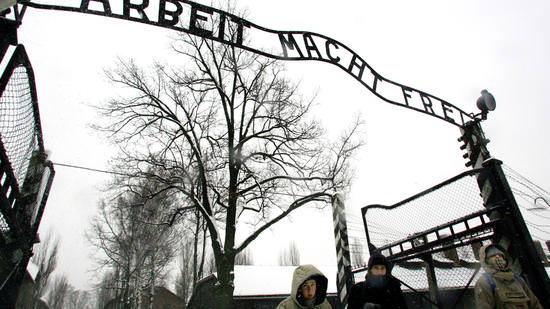
Holocaust survivor Oskar Jakob, who experienced the horrors of a death camp, two concentration camps and forced marches, said as a 13 year old, he “experienced the most horrific crime that ever has been committed.”
At Tuesday’s meeting of the Heartland American-Israeli Initiative, Jakob told his story of survival amid the death and brutality inflicted on the Jews by Nazi Germany during World War II.
The 85 year old, who was born in Romania, said on May 4, 1944 his family was given two hours to gather their belongings that could be carried and were taken to a nearby town.
Other Jewish families from nearby small towns were loaded onto trucks where after a 40-kilometer trip they spent 10 days in an open field.
Jakob said he never forgot what his grandfather told him and his 8-year-old brother and 10 year-old sister.
His grandfather said, “Children, we will never come back here.”
Loaded into train boxcars, Jakob and his family were taken to the Auschwitz death camp located in Poland.
The Jews were divided into two groups, those who could work at hard labor and those who would be forced in gas chambers to be murdered, Jakob said.
“The crematories were busy burning the bodies of Jews 24 hours a day,” he said.
Though he was 13, Jakob said he was big for his age and lied saying he was 17 in the hopes that he could work and not be sent to his death.
But, the work was “brutal,” he said. He carried two buckets of concrete at a time to repair buildings that were damaged by Allied bombing. They worked 12 hours a day with little food and under horrible conditions.
Those who could not work or endure the forced marches, “were shot on the spot by the SS,” Jakob said.
When the Russian Army advanced close to Auschwitz, Jakob said they were forced to march three days and three nights in bitter cold weather and in the snow.
He wore wooden shoes with no socks, but found newspaper to insulate his feet the best he could.
Later, 180 Jews were packed into an open boxcar for transport, Jakob said. People died from exhaustion and hunger.
He was forced to work in a German factory that made V-1 and V-2 rockets that were used against the Allies and Great Britain.
They worked 12-hour shifts and given three potatoes a day to eat, Jacob said. Sometimes one potato would be rotten, but he would eat it due to his hunger.
When the U.S. Air Force started bombing the factory, Jakob said they were marched to another concentration camp in Germany. They had no food for six or seven days and ate the snow to satisfy their thirst.
In the weeks and days before he was liberated, Jakob described seeing thousands of dead bodies.
He was liberated from the Bergen-Belsen concentration camp in Germany by British forces on April 15, 1945.
A British half-track knocked down the barbed-wire fence and a loudspeaker message in various languages announced they had been liberated.
Jakob said he and his fellow Jews were too exhausted to celebrate.
After being separated from his mother and sister at Auschwitz, Jakob said he never saw them again.
Jakob, who spoke Hungarian, came to New York City and worked as a Kosher butcher.
After he learned to speak English, he became a plumber. He said it was great to live in a country were he could work in two different trades.
Jakob lives in St. Louis, Mo. and winters in Polk County.
Heartland American-Israeli Initiative Vice President Marvin Kahn acknowledged Jakob’s story as a reason Israel is in existence today.
Jakob’s story has been documented in an interview he gave to Steven Spielberg for the United States Holocaust Memorial Museum.
The Heartland American-Israeli Initiative has been meeting monthly for a little over a year at Inn on the Lakes, according to President Justine Devlin.
It’s mission is to vigorously support, strengthen and promote the long-standing partnership between the United States and Israel through grass roots efforts designed to influence government representatives, local institutions and the general public.
For more information, visit www.heartlandaii.org.
mvalero@highlandstoday.com
(863) 386-5826
Originally published HERE.








